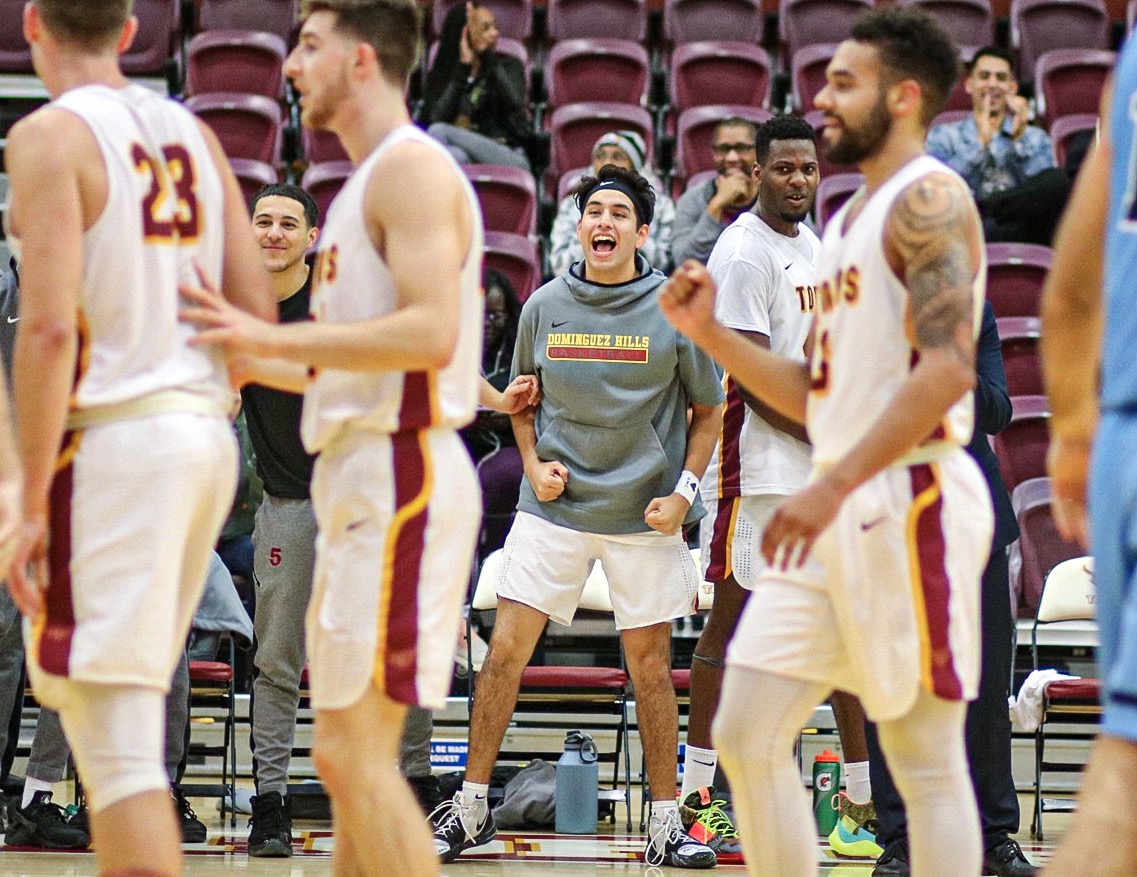Photos by Nova Blanco-Rico
By Jessica Olvera, Assistant Sports Editor
Editor’s note: The subject of this story is in Comm 320, sports journalism, as is the writer. As part of a class athlete interviewing assignment, the subject volunteered to be interviewed by the class. His personal story was too compelling for the writer to not write about it for The Bulletin.
Jackson Cascio was born into the game of basketball. His father was a high school coach, and Cascio’s mother introduced him to his first game at the ripe age of six days old.
He grew up immersed in the game, seeing his dad coach on the sidelines, watching it on TV and playing the sport every chance he could.

But he never could have guessed that this game would wind up saving his life, or at least help him cope with a psychological illness triggered while the person who gave him that life, his mother, was fighting for hers.
During Cascio’s senior year at Redondo Union High School, his mother was diagnosed with a brain tumor in her right frontal lobe and his dad found himself struggling to receive a steady income after being laid off.
After seeing his mom go through radiation treatments and feeling the weight of stress during this tough time, the then 17-year-old found himself experiencing the first of many anxiety attacks and even questioned if it was worth playing the game that he loved anymore.
When his dad was offered a job at Porterville College, they decided to make the move from Redondo Beach to the farm town of Porterville in the San Joaquin Valley, while his mom had to remain in Los Angeles for radiation treatments.
As his mom was focusing on radiation therapy, Cascio decided to use basketball as his escape from the stressors in his life and to persevere through focusing on what he can control, which was his attitude and effort on and off the court.
“Basketball was an escape from all the troubles that we’re going on around me,” Cascio said. “I couldn’t control my mom’s health or our financial situation. The only thing I could control was how hard I work in the classroom and on the court.”
At Porterville College, Cascio mentioned that he did not have a pleasant experience due to the lack of discipline and team chemistry, as his teammates were more focused on their individual success than as a team.
“Juco [junior college] is a different grind compared to high school and a four year university,” Cascio said. “You’re forever bonded by juco and there were a few outliers that to this day, are some of my closest friends.”
After graduating from Porterville, Cascio decided to transfer to CSUDH for the family and team-first atmosphere he felt during a recruiting visit. Cascio knew he belonged here all along as he found himself being named team captain for two years in a row because of his drive to make not only himself but those around him better.

More often than not, the title of the team captain is often referred to as the star player or a starter on a team. Cascio adds his definition to this honor through his larger than life personality and a constant showcase of support for his teammates, despite not acquiring a lot of playing time.
Once inside the gym, Cascio’s voice is often the loudest one heard as he yells words of encouragement to his teammates on the court and is the first one to greet them with a high five during timeouts.
“I know my role on this team,” Cascio said. “My role is leadership and I was brought here to be a great teammate and lead by example and voice by saying things that nobody wants to say.”
As someone who has dealt with some of life’s most difficult stressors with his mom recovering from a brain tumor and dealing with his unexpected psychological illness of anxiety, Cascio finds himself to be the “middle ground” for his family and team.
He holds his teammates to the same standards that he holds for himself. Controlling the controllables in life; your attitude and your effort.
“Any success we have is in big part to the leadership he brings to the table,” said teammate Alex Garcia. “We all know we can trust him because he has the determination and integrity to make it through a lot. When someone like that talks to you, you listen.”
Cascio admits that even though he gets on his teammates with correct criticism, it is all coming from a good place to challenge them to become better.

“Sometimes players don’t want to hear what the coach has to say but when it comes from a teammate, it clicks a little different,” Cascio said. “I’ll get on you for not playing hard but if you’re having a hard time, I’ll put my arm around you and tell you that everything is going to be okay.”
Academically, Cascio declared himself a journalism major and has plans to continue onto grad school, with hopes to become an assistant coach in the near future.
“I love this game and I don’t want to stop playing but I know eventually that the ball is going to stop bouncing,” Cascio said.
For now, Cascio will continue to be his high-spirited self, a champion of a teammate who is motivated to overcome any obstacle that life throws at him.

